Neil Young to Patti Smith: Don’t Chase the Rabbit
June 12 Update: Happy to have had this post linked to by music writer Chad Childers, with the websites of radio stations like Kool 100 FM in Abilene, TX, and 98.3 FM in Twin Falls, ID, picking up his piece. It looks as if Childers’ piece is being syndicated on the Web. Childers reports on the conversation between Patti and Neil, quoting from my post below, and properly attributing it to this site. Childers also recently reported on a great performance by the Canadian band City and Colour, led by Dallas Green, who at this year’s Bonnaroo festival ended their performance with a scintillating performance of Neil’s, “Like a Hurricane,” which you can listen to via this link.
—
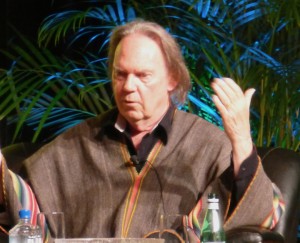 The BEA conversation between Patti Smith and Neil Young was one of the most anticipated events of this year’s convention, and I had previewed it with this blog post a few weeks ago, with a recollection of hearing Neil live when I was only fourteen years old. It turned out that last Wednesday’s program was not only a highlight of the convention, but a life highlight. The two artists shared a comfortable rapport and their dialogue reached a serious level about how songs are written, art is created, and artists and audiences connect in a reciprocal space where creative work flows.
The BEA conversation between Patti Smith and Neil Young was one of the most anticipated events of this year’s convention, and I had previewed it with this blog post a few weeks ago, with a recollection of hearing Neil live when I was only fourteen years old. It turned out that last Wednesday’s program was not only a highlight of the convention, but a life highlight. The two artists shared a comfortable rapport and their dialogue reached a serious level about how songs are written, art is created, and artists and audiences connect in a reciprocal space where creative work flows.
Patti’s first remark, at seeing dozens of photographers below the stage snapping pictures of them was lighthearted: “I feel like Sophia Loren at the Milan airport.” Referring to Neil’s new album “Americana” and his forthcoming book–and her new album “Banga,” which David Shanks of Putnam, Neil’s publisher, had cited in his introduction–Patti said “all the things that one creates comes from the same soul, the same heart, the same hopes.” She asked Neil about a song he’d retitled for the new album, a cover of “She’ll Be Coming ‘Round the Mountain,” which he’s retitled “Jesus’ Chariot.” He chuckled and attributed this to “the folk process” and new understanding of the song he gained through working with it, in which he now sees an unknown composer’s long-submerged intimations of “the Second Coming and the end of time.” Patti marveled at how a song we’ve sung “since we were little kids by rote, with no emotion” is totally reimagined by Neil and Crazy Horse.
After about fifteen minutes, the event organizers finally remedied a low-volume mic that Neil had been equipped with, or that his serape was perhaps masking, which until then had left the more than one thousand bookpeople in attendance uneasy and dissatisfied, leading one person to call out “May we have more volume on Neil’s mic.”
Much of the rest of the talk has already been reported well and comprehensively, by John Mutter in Shelf Awareness, Claire Kirch in Publishers Weekly, and Bob Minzesheimer in USA TODAY, and yet even with bad audio at the outset these two consummate and uncompromising artists engaged in such a full and wide-ranging converation that there are a few aspects of it I want to emphasize in this space.
- The first concerns Neil’s father, Scott Young. Judging by Patti’s first question on Waging Heavy Peace–about how his dad happened to call young Neil by the nickname “Windy”–Scott is an important figure in the book, and well he should be. It is too little known in this country that long before Neil became a musician and creative force, Scott was a prominent sportswriter and author in Canada, publishing bestselling books of fiction, nonfiction, and YA titles, and a member of the Hockey Hall of Fame (tantamount to a baseball writer in the States being inducted into Cooperstown). The book of his that I’ve read and treasure the most is Neil and Me, a heartfelt, double portrait that offers a mea culpa for the divorce and family break-up his constant travel as a working journalist caused, at least in part. Listening to Neil’s “Helpless” I hear echoes of that family pain. It’s a beautifully written book, as revealing as anything written about Neil, with the exception of Jimmy McDonough’s comprehensive Shakey. I recommend it highly.
- The next was the discussion between Patti and Neil over the writing of “Ohio,” and how the song came forth from Neil unbidden as a spontaneous response to the cataclysmic events at Kent State. He explained how CSN&Y got into the studio within days to record it, and how they rushed acetate copies of it out to radio statios so disk jockeys could respond to the shock and outrage provoked among their listeners by the campus killings. Neil described this as “the social networking of the time” and added “you could only get seven or eight plays off” the acetates, which degraded quickly. The ephemeral quality of the recording materials prompted an unlikely association in my mind, but an apt one, I think.
I was reminded me of the samizdat editions that writers in the Soviet bloc produced of their work during the Cold War. Without access to printing presses, they would roll multiple sheets of carbon paper into their typewriters, and with each key struck they hammered another ringing blow for creative expression. The medium had limitations, however. A Czech writer and publisher I met in Prague in 1991–post-Cold War–Vladmir Pistorius of Mlada Fronta Publishers, showed me his samizdat editions and explained that a rebel author could only put about five sheets of carbon paper in their typewriter, inter-leaved with as many sheets of typing paper, because each succeeding copy became more faint and less readable. It was humbling then to see what writers had done to create and share their work.
The writing, production, and perforce distribution of “Ohio” also reminded me of the genre of the “instant paperback,” like the Watergate Hearings books published by mass-market publishers back in the day, Norton’s edition of the 9/11 Commission in more recent years, or The United States v. I. Lewis Libby, which I pulled together with reporter Murray Waas at Union Square Press in 2007, after Scooter Libby’s trial in the leaking of Valerie Plame’s CIA identity. Neil and his bandmates were responding authentically and spontaneously to events around them, and meeting their audience in the public square, much as publishers have long tried to do for their readers.
- The last point is Neil’s discussion of how he never forces the writing of a song. Patti observed that Neil’s songs, “even ones produced from pain . . . seem so effortless, like they just came out of the wind, maybe that’s why your dad called you ‘Windy.'”
Neil answered, “Well, they do come that way. I don’t try to think of them. I wait till they come. A metaphor may be that if you’re trying to catch a rabbit, you don’t wait right by the hole. . . And then the rabbit comes out of the hole, he looks around. You start talking to the rabbit, but you’re not looking at it. Ultimately, the rabbit is friendly and the song is born. The idea is, he’s free to come, free to go. Who would want to intimidate or disrespect the source of the rabbit? And in that way if the song happens, it happens. If it doesn’t happen, it doesn’t happen. It doesn’t matter. That’s why I’ll write a lot of material and why I’ll suddenly not write any material. There’s no reason to write, it has to come to me, if it doesn’t come to me, I don’t want to have anything to do with it, I don’t want to see it, I don’t want to look for it. I really hate things that people work on. There’s nothing about music that should be working on it. There’s no reason to be something you’re not. Or trying to be somebody that you think is good.”
I am more eager than ever to read Neil’s book when Blue Rider Press publishes it in October. Patti and Neil seemed like old friends, to each other, and to us in the audience. It was a treat to hear them in conversation, a BEA moment I’ll treasure forever. If you couldn’t be there I hope this report and the photos will make it come alive for you, and if you were in the hall, I hope I’ve lent some useful perspective on such a special occasion.
- A badge from Blue Rider Press was left on many chairs in the Special Events Hall at the Javits Center
- This photo is also on the book jacket of ‘Waging Heavy Peace.’
- Patti & Neil arriving on stage.
- Patti & Neil getting comfortable.
- Attendees in the hall could look at large screens, or at Patti & Neil live in the middle of the stage. This photo was taken of the screen.
- Patti & Neil both talk with their hands.
- Patti & Neil, full of rapport.
- Patti & Neil waving farewell to the appreciative audience.
- Patti & Neil beaming their good wishes.

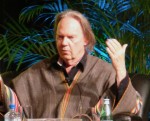
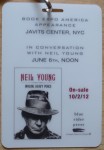
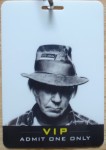
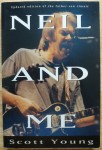
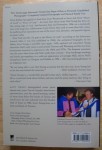
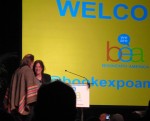

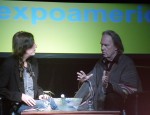
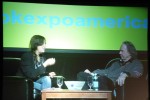

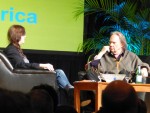
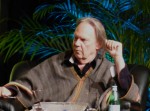
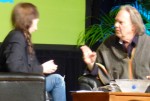
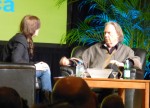

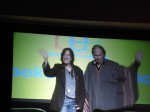
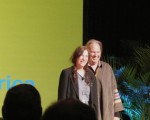
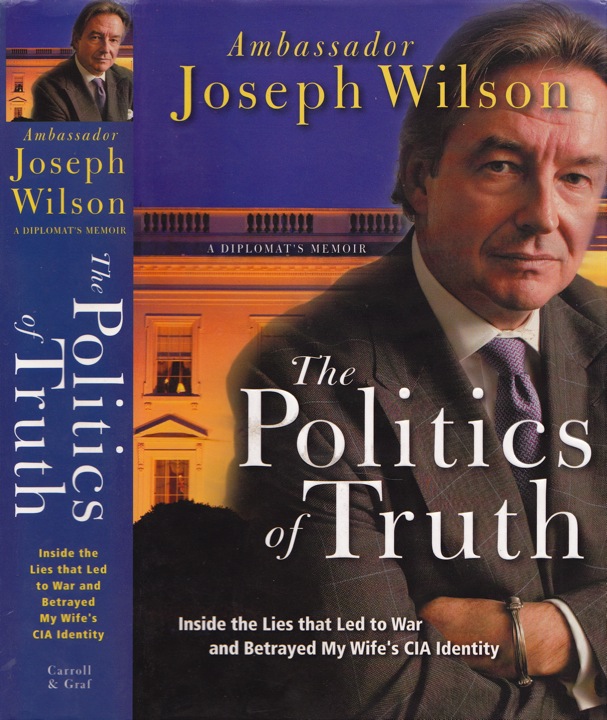

thanks for this. would have loved to be in the room with these two amazing artists.
You’re welcome. Thanks for visiting and reading my blog. By the way, this link will lead you to all the posts on the site that mention Neil Young, http://philipsturner.com/?s=neil+young. Thanks, Philip
Phil, thanks so much for sharing your observations on this conversation between two of my faves. Lucky you!
Thanks, Karen, it was a special day. Best to you and Peter.
Philip, I was in the room–and wrote a quick dispatch that night–but you captured it really well. Excellent post.
Thanks, Mark, glad to read yours too. Just shared it out on Facebook.